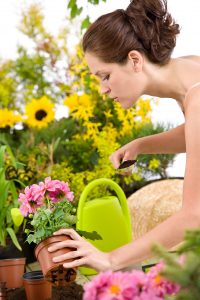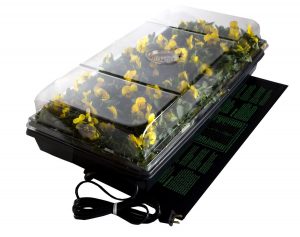Useful Tips for Novice Gardeners

Do you want to give gardening a try but aren’t sure where to start? The following guide offers some excellent advice on how you can make your starter garden flourish:
1. Know Your Zone
Plants can’t always grow in all regions. Each plant requires a specific climate and soil type to flourish. Prior to starting your garden, check to see just what can grow in your garden. The US Department of Agriculture provides a hardiness zone map as a guide. In addition to the right location, you should also ensure that you are growing the plants during the right season.
2. Stick with the Easy-to-Grow Plants
There are certain plants and flowers that are just easier to plant and maintain than others. These tend to be hardy flora that don’t have too many requirements and can handle some mismanagement. If you want to grow flowers, then sunflowers, roses, foxgloves, dahlias, and petunias are excellent choices. If you want to grow veggies, try your hand at onions, peppers, basil, tomatoes, and bush beans.
3. Grow Seeds Inside

A good way to make sure that your plants survive is to keep the seedlings indoors. To do this, you will need toilet rolls, a trough, and some seeds. Close off one end of the toilet roll and place it in the trough. Then, fill the individual rolls with soil. You can plant your seeds in here. Alternatively, you can purchase a seedling kit with a heating mat and use that to produce some seedlings.
4. Soil and Drainage are Key to Potted Plants
There are two essential things that you should ensure when planting potted plants. The first is that the container has plenty of holes in the bottom through which the water can drain out from. Inside the pot, place a layer of rocks. On top, make sure to have composted soil. You can use leftover food to make the compost yourself.
5. Start Small
To make it easier for you to garden, first start with a contained plot of soil. It is best if you begin with a container garden. This will make it a lot easier for you to manage and maintain the soil better. You can also spot weeds sprouting a lot faster as well. Keep the container near a spot that you look at often to encourage you to garden.
6. Keep Plants in the Right Spot
While all plants need sun light, they require varying amounts of sunshine. Some plants thrive in bright light. Others prefer dim light. Others still need partial shade. This is why you should be careful about where you place your plants. To make things easier for you, place your pots in a trolley that you can move around to ensure they get adequate amounts of sunlight.
7. Water Your Plants Carefully
Did you know that there was a right and wrong way to water your plants? It is best to only water the base of young plants. Getting the leaves wet could lead to mold and other complications. You should also aim to provide your plant with an inch of water each week. If you see yellow leaves on the plant, this is a sign that you are overwatering the plants.
 8. Prune Your Plant
8. Prune Your Plant
It is actually very important to prune your leaves on a regular basis. It helps the air to circulate through the plant a lot better. Also, there will be fewer leaves to get as you water your plants.
9. Grow Organic Food
It is quite simple to grow organic food in your own backyard. It is simply a matter of choosing natural ways of fertilizing your plants and pest control. Your food will taste better and be healthier too.
These are some really helpful tips to getting your first garden on its way.
To learn more about vegetable gardening of various kinds, you should absolutely check out The MiniFarming Guide to Vegetable Gardening.

